Our cats make sounds ranging from purrs to meows to hisses and growls — but what do they mean?
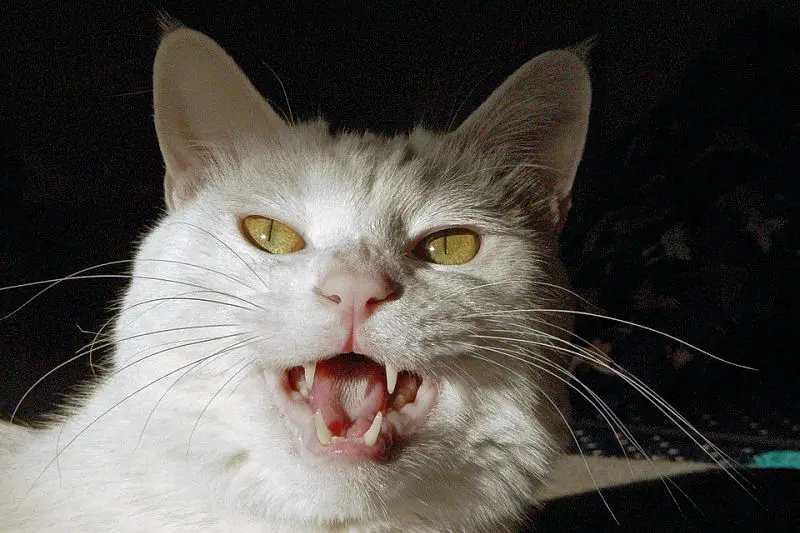
When owning a cat, we’re pretty sure you’ve heard them meow a lot! But did you know that his or her different yowls and meows have different meanings behind them? It isn’t just about meowing for attention, but can also mean an underlying condition that your cat can’t express through words, but through the sounds she makes.
Or, perhaps kitty just wants to show his happiness with you. Either way, it’s important to learn about the different cat sounds your cat makes for you to properly address his problems and act upon it. Wondering what these meows and yowls mean?
Here are the 11 most recognized cat sounds – and what they mean!
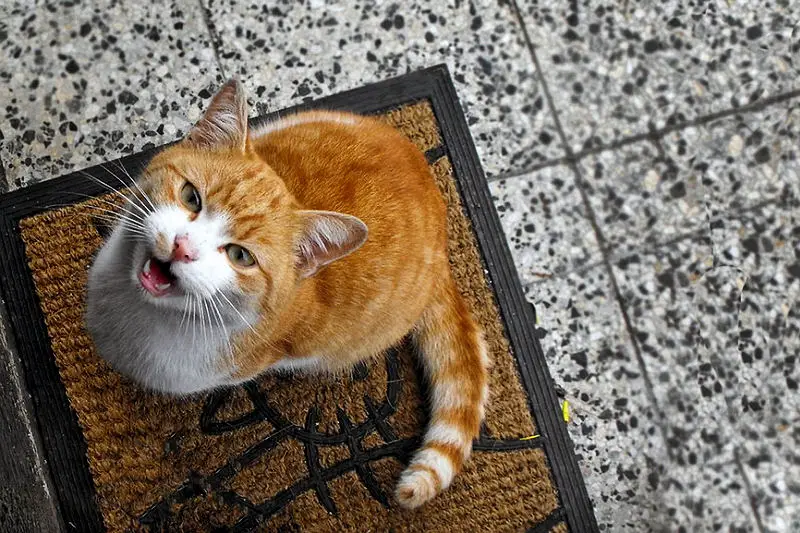
1. Short Meows
A short meow is the basic and most popular cat meows for cats who just want to say hi! This is normal and nothing to worry about, as your cat is simply happy to see you. Give him a pet, because it means he wants a bit of attention.
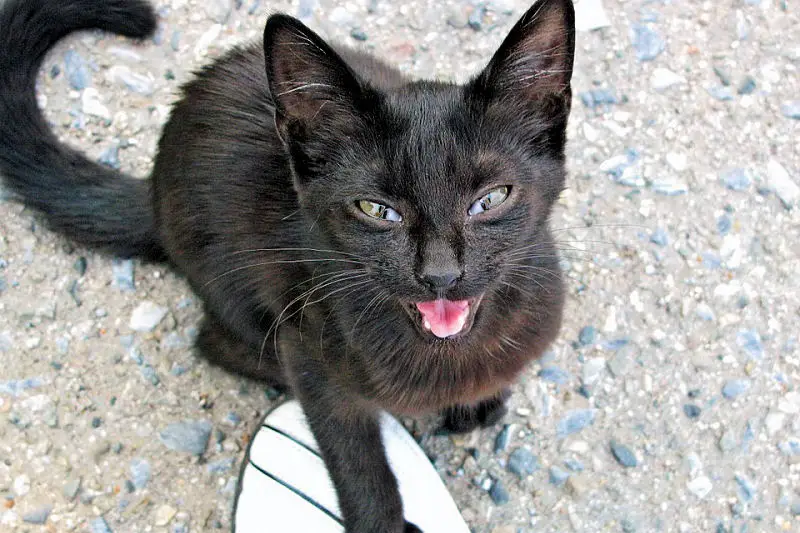
2. Multiple Meows
If your cat meows multiple times or a few meows every minute, it says he’s VERY excited and happy. It’s more comfortable version of the short meow, meaning that your cat is saying that it’s great to see you. Just like the short meow, give him a pet!
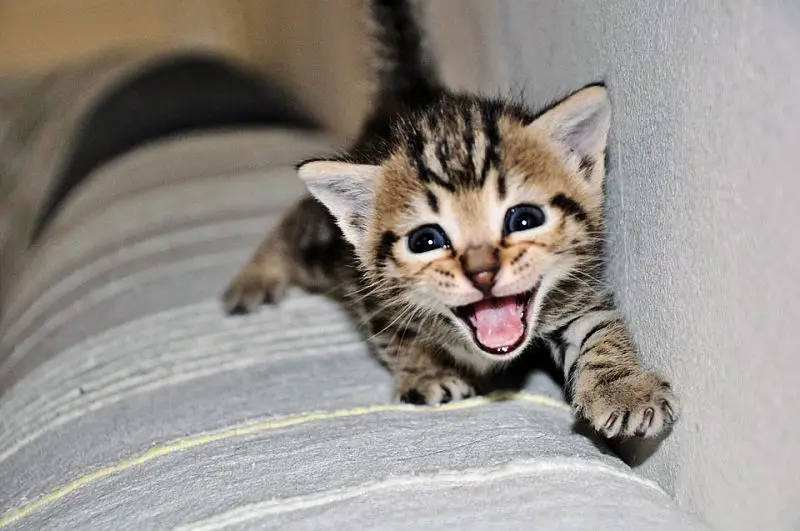
3. Mid-Pitch Meows
For cats who have mid-pitch meows, it usually means he’s asking for something. It might be playtime or attention, or he may want to go out to do his business. Other times, it means that he wants food. If it’s time for dinner and he starts meowing this way, you know he’s hungry!

4. Long Meows
Just like mid-pitch meows, your cat wants something. But it isn’t just a plea; it’s a demand! Your cat may be VERY hungry, or he simply demands attention from you after a long day alone. Or, he wants you to open the door, so he can go out or back in.

5. Low-Pitch Meows
A low-pitch meow means your cat is complaining and he’s unhappy about it. It’s time to show your attention or fill up his empty bowl, or he will be in a bad mood for a long time. He might also be mad at something you did, like forgetting him outside!

6. High-Pitched Meows
High-pitched meows is an expression of pain. It might not be something wrong with his digestion or body, but it may be physical pain, such as accidentally kicking him or stepping his tail. This yowl helps you know if he’s hurt from a fight as well.

7. Growls or Howls
If your cat growls, that means he’s feeling VERY negative. They are usually growling when fighting with other cats, trying to protect their territory. A growling cat is an angry cat, so I urge you to stay away to avoid any scratches or bites. If your cat begins to howl, it means she feels danger or needs immediate help because of an injury or sickness. Go to a veterinarian as soon as possible.
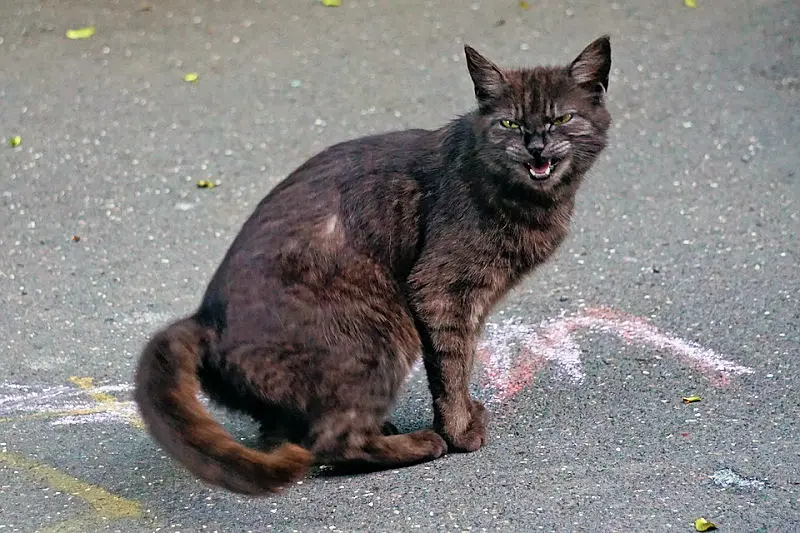
8. Hissing
Just like growling, a hissing cat can also mean someone that’s very upset or irritated. It can also show fear, since cats would usually hiss when he’s surrounded by unfamiliar people or in a new environment. It’s best to let him be first.
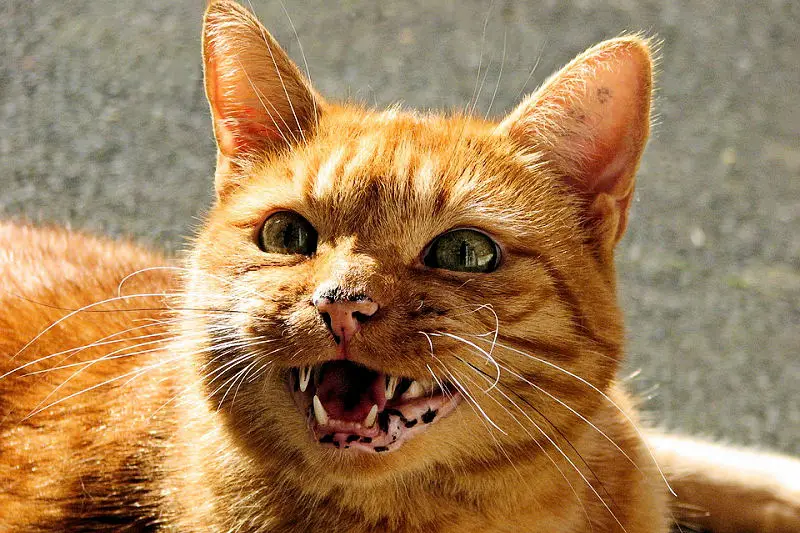
9. Chirping
Chirruping means that your cat wants something but he can’t get it. But this isn’t about food. He might see prey out of the window but he can’t move to it. It’s a short and stuttered meow that’s a mix of both excitement and frustration.
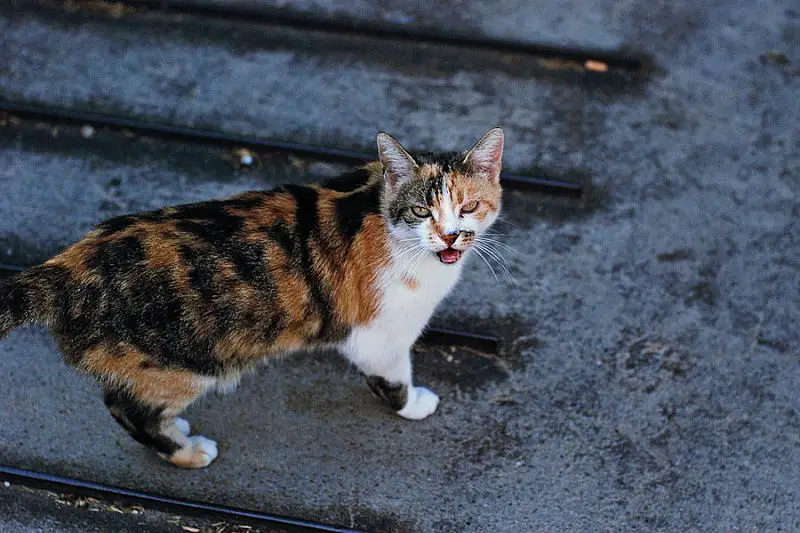
10. Caterwaul
Caterwauls are low moaning sounds female cats would make when in heat. It alerts other cats that she’s in heat and ready for mating. Your cat may also have an uncomfortable-looking stare to go along with these cat sounds.

11. Purring
Purring is a sweet sounds that means that your cat feels content with your. It means that he’s happy or sleepy, comfortable as he sleeps on your lap or cuddles with you. Mother cats would also purr to her kittens to comfort them. Read more on the healing powers of purring.
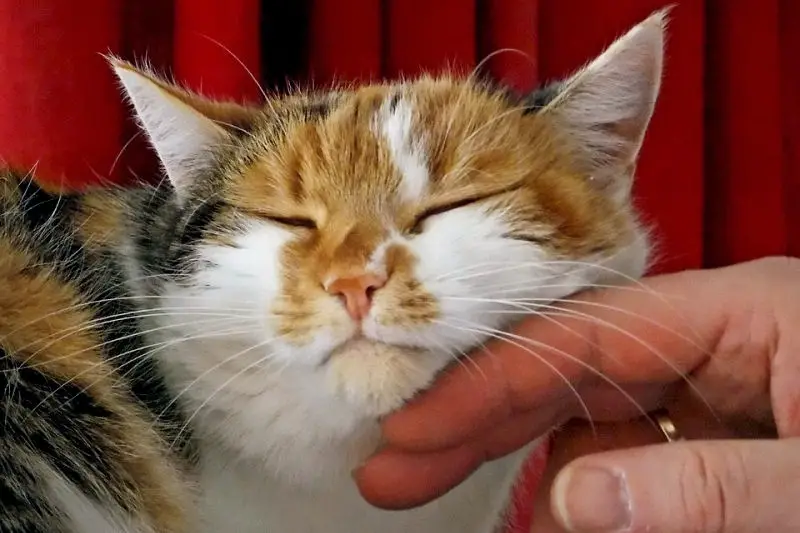
Tips on Helping Your Cat Control His Meowing
If your cat meows a lot, then there are various reasons as to why it happens! So if you want to control his meowing and make sure that he stays healthy and disturbs no one in the household, here are some things to follow:
- Make sure that your cat has access to all his toys and a comfortable environment, allowing him to have fun and enjoy while you’re out of the house or running errands. He might just want to play or sleep in a quiet area.
- Give your cat access to treats or food a few times a day. He may be hungry! Studies show that it’s best to feed your cat multiple times a day instead of one large meal to avoid indigestion or hunger.
- Play with your cat a bit! Your cat needs attention, just like many humans. Give him a few minutes of cuddle time or petting, making him feel loved.
- If your cat looks uncomfortable and in pain, he might be suffering from more symptoms other than just meowing a lot. Take him to the veterinarian to evaluate if he’s sick or requires medical attention.
If your cat incessantly meows or makes different sounds, then it’s time to learn how to evaluate what they mean! Each of your cat’s meows, hisses, purrs, or yowls mean something, and while some can be brushed off by a gentle pet, some can be serious and will need to be checked by a veterinarian.
Here’s a cat noise you don’t hear every day
Listen to the sound of the Caracal cat … how’d you like to wake up to the sound of this cute little fella every morning?
Summary
This guest post was kindly provided by Annie (founder of MeowKai) — she writes about cat behavior, health issues, and tips and tricks on how to get your cat to behave! We hope that this article on cat sounds and what they mean will help you become more knowledgeable about how to care for your cat. If you have any questions or would like to share your experience, please leave us a comment below.
Be sure to check out our post on Cat Trilling.



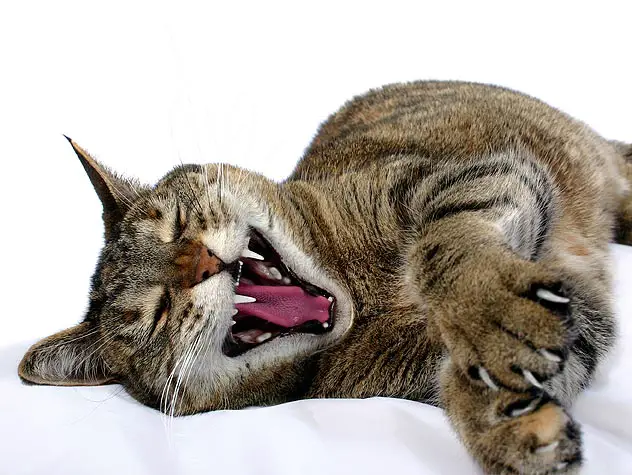
Purring can also be a sign of severe distress. Dennis Turner explains this from a biological-behavioral standpoint in “The Domestic Cat”.
Anecdotal evidence: Sennapoes, my tomcat, was purring after he dragged himself into the house with a completely shattered right front leg, and he purred all the way to the vet, with severe blood loss.
(He did live a healthy, very mobile 8 years after that incident, but his surname was “Tripod” for a reason. After that incident, he became the most attached, cuddly cat I’ve ever had.)
Each cat should have a “safety spot” to which he or she can retreat when a situation becomes too stressful. This would usually be a safe place in another room (in a study under the desk or behind furniture). Should your cat be in a situation that causes undue stress (vacuum cleaners, unruly grandchildren, the neighbour’s dog), make sure that he has immediate access to his safety spot.
I would like to nuance what the author says about “howling” being a sign of physical discomfort.
Cats will often go to great length to suppress pain – to the point where you may not even notice it. Anecdotal evidence: again Sennapoes lying on the floor with a completely shattered right front leg, in his own blood, but not making any sound. The only thing that triggered me to take a look was the fact that he came back inside without immediately demanding attention.
The only cat I’ve heard howling was beyond hope. I’ll spare you the details – it was not my cat, but my blood still curdles when I think of it.
If a cat is withdrawn, and acts “unnatural” and uncomfortable when given attention, assume pain. Another sign may be unprovoked aggressive behaviour of other feline companions who are usually friendly. For some reason, cats who are usually best pals, or even mother and child, can react very aggressively towards their companion if said companion is hurt.
This is so cute! What a great idea for a blog and I LOVE the name of the blog. Move over Huffington Post! I was interested to read your list as our cat made a really weird half cry half howl when one of our dogs died. She’s never done that before and never did it since. It must have been her way of showing grief.
What about this, I am Lilly Bug, a calico, i can make a barking sound, what does that mean? Or my partner, Joel the Brave a black tuxedo kitten that makes a fire engine sound. What does that mean? We both blog at 2 Cats and a Blog.
Nice one
What an awesome list! Getting to learn what each sound means can help new pet owners know what is happening to their pets. I worked at an animal shelter and some of these sounds really helped know how to “talk” to cats without them seeing you as an enemy.
Any experience with Lynxpointe Siamese?
What an interesting, wild sound!
That feline has personality!
I have a Lynxpointe Siamese who neither purrs nor meows.
He has an ultra loud trilling voice that resounds throughout the entire house – especially 4:30 a.m. when he wants breakfast.
He also “trills” when he wants to be picked up (15 pound kitten) and hugged.
We can “trill” back and forth for long periods of time.
I am not sure what he is saying nor what I am saying.
Just because your cat is purring do not assume that all is well. I’ve witnessed cats purring through child birth which is, I’ve been told, not a pleasant experience. Also as mentioned above cats have been known to purr with very traumatic injuries. I believe the act of purring releases chemicals into the cats brain that trigger pleasure centers and also block pain. Also I believe at times it can be a form of meditation to help calm themselves down. In reality we don’t really understand every effect that purring has on our amazing pets. Or even every reason for it. But if you know your cat its not hard to tell whats on their mind mist of the time.
I agree Cats can Purr when they are upset and angry too, talking of cat noises what about Birmans, after 20 years of Birmans they make a specific sound like a burr and also can yowl too ive had other breeds besides Birmans and i love the sound they make,they are also very vocal
It’s amazing how these beautiful animals communicate with us through different sounds
I actually read that there was a study done in Japan, and they came to a conclusion that Cats actually understand what we say to them. They understand our words
Becuase they have been living with humans for such a long time they have actually picked up words!
How amazing is that!
Now you can actually hold a conversation with your Cat just how you would with a toddler
I was just reading this review on Cat Language Bible which is a guide that shows you how you can hold a conversation with your Cat
It actually looks really interesting but was wondering if you have read it or heard about it?
Here’s the review – https://catloverhere.com/2018/04/25/cat-language-bible-review/
What do you Cat parents think? any good?
Thanks!
Tom Davies – my cats apparently do not understand. When they destroy things, which is rare, I tell them I’m going to take them to the humane society but no change in behavior. Or they know I would never do it.
So what is the sound where the mouth is not open, not a growl, not a moan, but the cat is very unhappy. My vet didn’t even know. Thoughts anyone? She also missed “trilling” – where the mother cat is calling to her kittens. Mine does it when she is very happy and wants me to pet her. She usually sits on my desk while I’m working.
My cat will chirp at me, the way cats chirp at birds, when she wants me to get out the laser pointer and play with her. The “short meow” can be an affirmative answer to a question. They do talk, you know.
I believe cats are smarter than we think, and do understand us. I found out more when i found this link explaining that we can communicate with them. https://bit.ly/31QNAyC
Thanks
I used to have a cat who never mewed, only gurgled like a human baby while sitting on my lap, his head cradled in the crook of my arm, or with his head against my heart.
What about a cat that doesn’t meow all that much? All I get is something that sounds like “proo.” When he was in the shelter, in his cage Mickey aged about 1yr, was yelling – not to say shrieking – his head off. Strong Tom cat meows. Now I get “proo” mostly, and the odd “moowam,” “maahoo,” he’s now 5yrs. And I love him sooo much. Even with “proo” when he feels like it.
I am first time cat mama and I didnt understand anything about their body language or the sounds they make and mating habits. This has helped me tremendously and I would like to see it on my face book page so I can learn more about care of my cats. I have 8
I’m familiar with all of those sounds. However my new rescue actually whines! I know it may sound odd, but that’s the best way I can describe it! She doesn’t meow, she only whines. What category should that go under? She doesn’t do it at the vet, instead she is stone silent.
Good article, but in several places, it normalizes letting cats outside. Unless they have a catio or you have a cat stroller, letting them outside is a terrible idea! Not only are they at risk for getting hit by a car, getting stolen and tortured, getting ripped apart by dogs, getting poisoned, and the list goes on and on. I have seen all of these things, and more, happen to cats that their “parents” thought wouldn’t happen to them. It can, and it does. Additionally, they themselves are problemmatic to birds and other small wildlife, who have a right to be outside and no one to protect them. Cats don’t have to be let outside to be happy. They live MUCH longer if you don’t let them out into a dangerous world. Please don’t imply it’s normal to let them outside!
We have five cats. Our tuxedo cat never meows but has a motorboat purr. Our tabby cat has an annoying high pitched meow, almost kitten like even though he’s seven years old. Our tortoiseshell doesn’t meow unless you make her angry and it’s more of a growl. The calico talks to me via various forms of meows. I speak to her and she talks back. If I make the noise she comes running through the house and immediately engages in conversation with me. We adopted a korat while stationed in Italy and she’s very sweet and calm but hates the other cats. She doesn’t meow, she does make a yowling sound sometimes when she wants to be let into the bedroom upstairs. Cats are certainly interesting characters with very distinct personalities.
Kitty The Younger is also a “barker”. Her favorite trick is to bark DIRECTLY into my ear if breakfast is more than 2 minutes late (she’s lucky she’s cute). Kitty The Elder will bite my hair for the same reason.
Anyway, I’ve had cats all my life and here’s a question:
Regardless of how much they “talk”, I’ve noticed that the resonance and volume of their purrs varies from individual to individual (extremely vocal cat has almost imperceptible purr, and conversely, a cat that barely speaks has a purr that sounds like an idling diesel). All of them have been (and are) happy and healthy. Is this something from kittenhood or…?
Those of us who love cats agree: cats should be kept INDOORS ONLY! for their safety and wellbeing, wherever they live and whatever their human family members (never “owners,” a very negative term and one we never use!) have “always done” or found convenient.
And yes, purring isn’t confined to what the writer mentioned. Cats in physical or emotional distress will sometimes purr, as well, as purring is known to be healing, not only to cats but to us as well.
This was such an interesting read! I never realized how much I was missing by not paying attention to my cat’s sounds. The breakdown of each sound and its meaning was super helpful. Thanks for shedding light on this—now I feel more connected to my furry friend!
I loved this post! It’s fascinating to learn about the different sounds our feline friends make and what they really mean. I had no idea that a slow blink could signify trust! Can’t wait to pay more attention to my cat’s vocalizations. Thanks for sharing!
I never realized how much my cat’s sounds could communicate! The section about the different types of purring was especially eye-opening for me. I thought all purring was the same, but now I see there’s so much more to it. Thanks for this informative post—definitely deepening my bond with my furry friend!
I absolutely loved this post! It’s fascinating to learn about the different sounds cats make and what they really mean. I always thought a purr was just a sign of contentment, but now I see there’s so much more to it! Can’t wait to pay closer attention to my cat’s vocalizations. Thanks for sharing!
I absolutely loved this post! It’s fascinating how much our feline friends communicate through sounds. I never knew that a slow blink could be such a sign of affection. Thanks for breaking down these cat sounds; I can’t wait to pay more attention to my cat’s vocalizations!